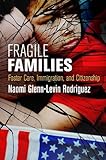Fragile Families : Foster Care, Immigration, and Citizenship / Naomi Glenn-Levin Rodriguez.
Material type: TextSeries: Pennsylvania Studies in Human RightsPublisher: Philadelphia : University of Pennsylvania Press, [2017]Copyright date: ©2017Description: 1 online resource (232 p.) : 2 illusContent type:
TextSeries: Pennsylvania Studies in Human RightsPublisher: Philadelphia : University of Pennsylvania Press, [2017]Copyright date: ©2017Description: 1 online resource (232 p.) : 2 illusContent type: - 9780812294286
- Child welfare -- California -- San Diego
- Children of immigrants -- Legal status, laws, etc. -- California -- San Diego
- Children of immigrants -- California -- San Diego -- Social conditions
- Foster home care -- Children -- California -- San Diego
- Immigrant children -- Institutional care -- California -- San Diego
- Immigrant families -- California -- San Diego -- Social conditions
- Anthropology
- Folklore
- Human Rights
- Law
- Linguistics
- Political Science
- Public Policy
- Sociology
- POLITICAL SCIENCE / Human Rights
- 341.4/8572 23
- K639 .R637 2017eb
- online - DeGruyter
| Item type | Current library | Call number | URL | Status | Notes | Barcode | |
|---|---|---|---|---|---|---|---|
 eBook
eBook
|
Biblioteca "Angelicum" Pont. Univ. S.Tommaso d'Aquino Nuvola online | online - DeGruyter (Browse shelf(Opens below)) | Online access | Not for loan (Accesso limitato) | Accesso per gli utenti autorizzati / Access for authorized users | (dgr)9780812294286 |
Frontmatter -- Contents -- Introduction -- Chapter 1. “Worthy” Migrants -- Chapter 2. Belonging and Exclusion -- Chapter 3. Working the Gap -- Chapter 4. Decisions, Decisions -- Chapter 5. Intimacies -- Conclusion -- Notes -- References -- Index -- Acknowledgments
restricted access online access with authorization star
http://purl.org/coar/access_right/c_16ec
In the past decade, debates over immigrant rights and family rights, and accompanying concerns over birthright citizenship, have taken center stage in popular media and mainstream political debates. These debates, however, frequently overlook the role of the public child welfare system in the United States—the agency charged with protecting children and maintaining the integrity of families. Based on research conducted in the San Diego-Tijuana region between 2008 and 2012, Fragile Families tells the stories of children, parents, social workers, and legal actors enmeshed in the child welfare system, and sheds light on the particular challenges faced by the children of detained and deported non-U.S. citizen parents who are simultaneously caught up in the immigration system in this border region.Many families come into contact with child welfare services because of the precariousness of their lives—unsafe housing, unstable employment, and the conditions of violence, drug use, and domestic violence made visible by the heightened police presence in impoverished communities. Naomi Glenn-Levin Rodriguez examines the character of child welfare decision-making processes and how discretionary decisions constitute the central avenue through which race, citizenship, and other cultural processes inflect child welfare practice in a manner that disproportionately impacts Latina/o families—both undocumented and U.S. citizens. Drawing on ethnographic fieldwork to look at how immigration enforcement and child welfare play central roles in the ongoing production of citizenship, race, and national belonging, Fragile Families focuses on the everyday experiences of Latina/o families whose lives are shaped at the nexus of child welfare services and immigration enforcement.
Mode of access: Internet via World Wide Web.
In English.
Description based on online resource; title from PDF title page (publisher's Web site, viewed 26. Aug 2020)


